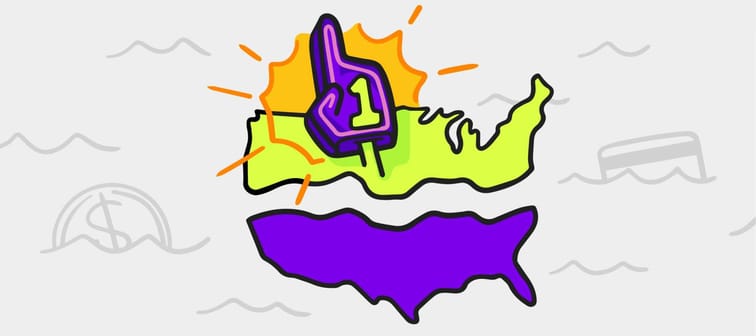Borrowers beat the odds
Average scores increased by at least two points in all 50 states, with Maine, Mississippi and Nevada tying for the title of “most improved” by gaining six points each.
Borrowers in all areas and all age groups were able to weather the loss of federal relief programs that helped many people keep up with their debt obligations, Experian says in a blog post.
Americans also endured a considerably higher cost of living; when the credit score data was pulled in September, the inflation rate had ratcheted up to 5.4% compared with the same month a year earlier.
Rising wages may have been an important factor that helped many people avoid debt and protect their scores, the credit reporting agency says. The Great Resignation sparked labor shortages across various industries last year — peaking at 4.5 million quits in November — allowing workers to demand higher pay to stick around.
Earn cash back on what you buy most
Maximize your spending and earn up to 6% cash back on groceries, streaming, gas, and more. Whether it’s everyday purchases or splurges, this card puts money back in your pocket.
Learn moreWhere scores go south
While the new numbers show that Americans handily averted a credit catastrophe, the findings still reflect decades-long divisions between northern and southern states.
Every state with a credit score above 730 (besides Hawaii) lies in the northern half of the country. Those states typically have higher average incomes, and homeowners have substantially higher mortgage balances.
For the 10th year in a row, the northern state of Minnesota ranks the most creditworthy in the country. Its average score improved three points last year to 742.
Meanwhile, every state with a credit score below 700 lies in the South — as do nine of the 10 poorest states in America.
Mississippi takes the bottom spot in both categories, with an average credit score of 681 and one in five residents living below the poverty line.
People in the South consistently harm their scores by using more of their available credit, Experian’s Rod Griffin told CNBC in 2019, adding that the reason is likely both economic and cultural.
“That, to me, is a telling issue. People may be using their credit cards as a supplement to their income in the South, or are just using them more and carrying a higher balance,” Griffin said.
A habit of carrying higher balances is especially damaging for people with low scores and thus low credit limits. That’s because a key factor in determining credit scores is credit utilization: the percentage of a person’s available credit that is currently being used.
A person carrying a $2,000 balance from month to month on a credit card with a limit of $5,000 will harm their score more than a person carrying the same amount on a card with a $10,000 limit.
The cost of low credit
Among other penalties, a low score subjects borrowers to higher interest rates and low credit limits. Buying or affording a home can be an especially daunting challenge.
Experian estimates the difference between taking out a 30-year, fixed-rate $250,000 mortgage with a 670 FICO score and a 720 FICO score could be $72 a month — or $26,071 in interest over the lifetime of the loan.
That’s a gap of just 50 points, while the gap between the average scores in Mississippi and Minnesota is currently 61 points.
However, even if your credit score is positively Minnesotan, that doesn’t mean there isn’t a need for improvement.
A 740 credit score is at the bottom of the “very good” range in FICO’s rating system and a long way from “exceptional.” Many homeowners are wielding considerably higher scores to keep their monthly bills down.
Homeowners took on $1.03 trillion in new mortgage debt in the fourth quarter of last year, according to the Federal Reserve Bank of New York, and two-thirds of that came from borrowers with credit scores over 760.
This 2 minute move could knock $500/year off your car insurance in 2025
OfficialCarInsurance.com lets you compare quotes from trusted brands, such as Progressive, Allstate and GEICO to make sure you're getting the best deal.
You can switch to a more affordable auto insurance option in 2 minutes by providing some information about yourself and your vehicle and choosing from their tailor-made results. Find offers as low as $29 a month.
Find the best rate for youAverage FICO score by state in 2021
-
Alabama: 691 (up 5)
-
Alaska: 717 (up 3)
-
Arizona: 710 (up 4)
-
Arkansas: 694 (up 4)
-
California: 721 (up 5)
-
Colorado: 728 (up 3)
-
Connecticut: 728 (up 5)
-
Delaware: 714 (up 4)
-
District of Columbia: 717 (up 4)
-
Florida: 706 (up 5)
-
Georgia: 693 (up 4)
-
Hawaii: 732 (up 5)
-
Idaho: 725 (up 5)
-
Illinois: 719 (up 3)
-
Indiana: 712 (up 5)
-
Iowa: 729 (up 3)
-
Kansas: 721 (up 4)
-
Kentucky: 702 (up 4)
-
Louisiana: 689 (up 5)
-
Maine: 727 (up 6)
-
Maryland: 716 (up 4)
-
Massachusetts: 732 (up 3)
-
Michigan: 719 (up 5)
-
Minnesota: 742 (up 3)
-
Mississippi: 681 (up 6)
-
Missouri: 711 (up 4)
-
Montana: 730 (up 4)
-
Nebraska: 731 (up 3)
-
Nevada: 701 (up 6)
-
New Hampshire: 734 (up 5)
-
New Jersey: 725 (up 4)
-
New Mexico: 699 (up 5)
-
New York: 722 (up 4)
-
North Carolina: 707 (up 4)
-
North Dakota: 733 (up 3)
-
Ohio: 715 (up 4)
-
Oklahoma: 692 (up 2)
-
Oregon: 731 (up 4)
-
Pennsylvania: 723 (up 3)
-
Rhode Island: 723 (up 4)
-
South Carolina: 693 (up 4)
-
South Dakota: 733 (up 2)
-
Tennessee: 701 (up 4)
-
Texas: 692 (up 4)
-
Utah: 727 (up 4)
-
Vermont: 736 (up 5)
-
Virginia: 721 (up 4)
-
Washington: 734 (up 4)
-
West Virginia: 699 (up 4)
-
Wisconsin: 735 (up 3)
-
Wyoming: 722 (up 3)
Kiss your credit card debt goodbye
Millions of Americans are struggling to crawl out of debt in the face of record-high interest rates. A personal loan offers lower interest rates and fixed payments, making it a smart choice to consolidate high-interest credit card debt. It helps save money, simplifies payments, and accelerates debt payoff. Credible is a free online service that shows you the best lending options to pay off your credit card debt fast — and save a ton in interest.









